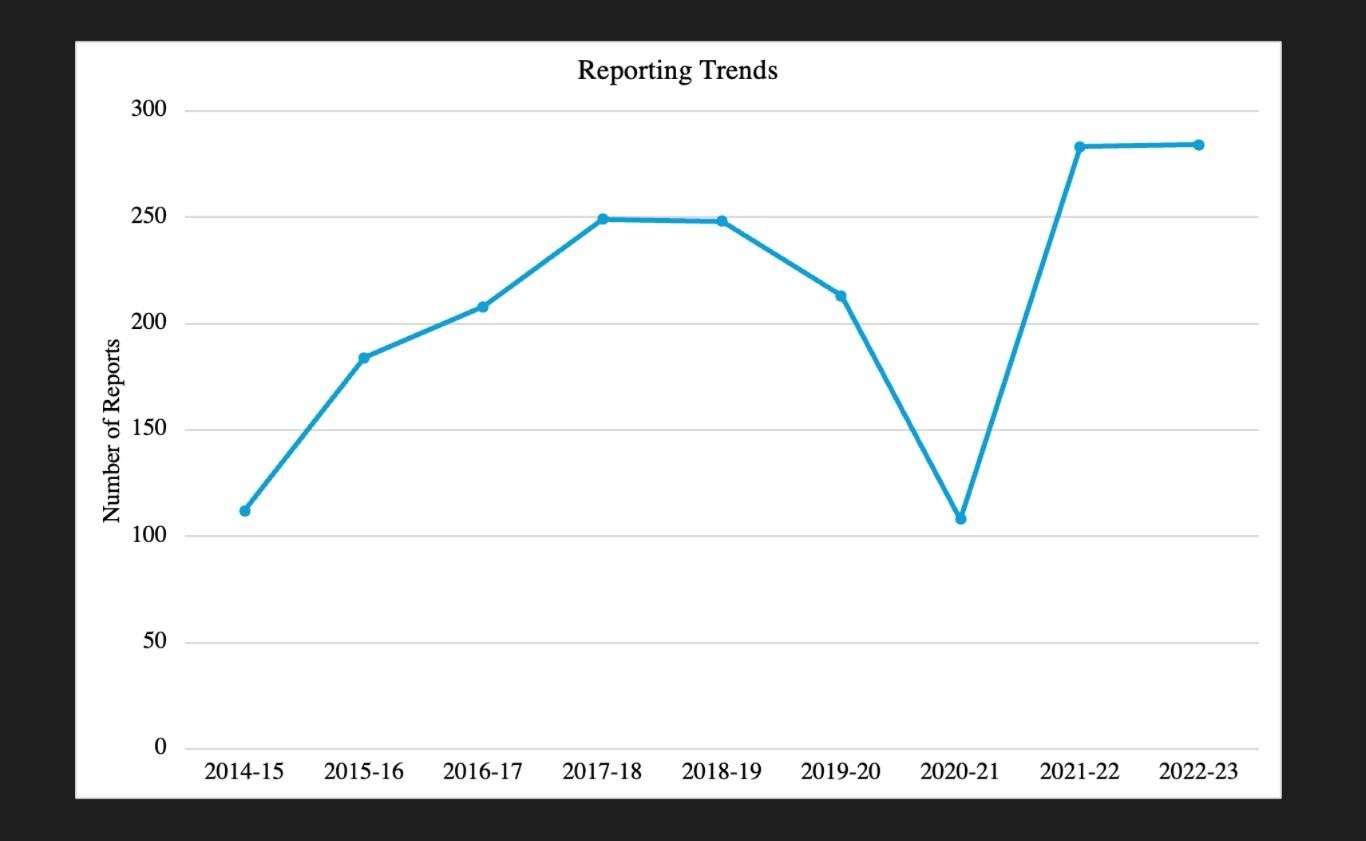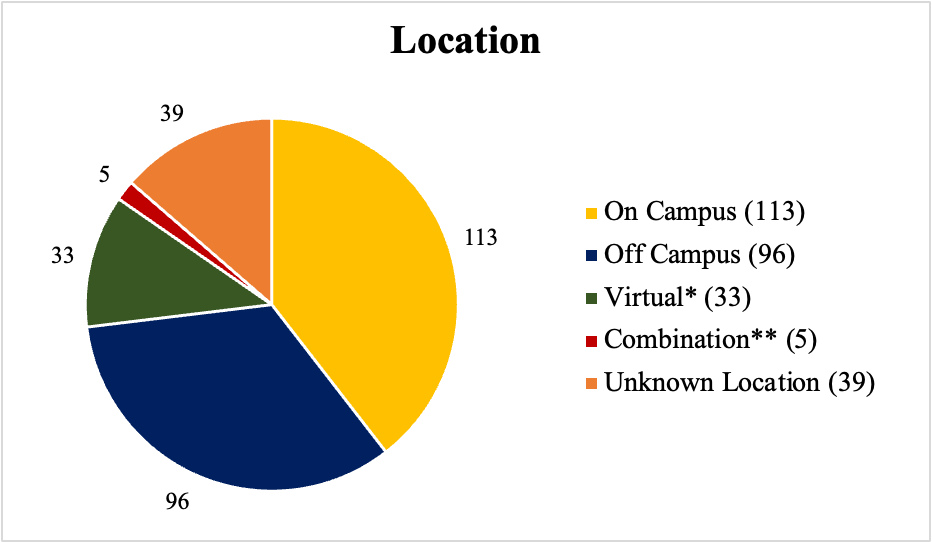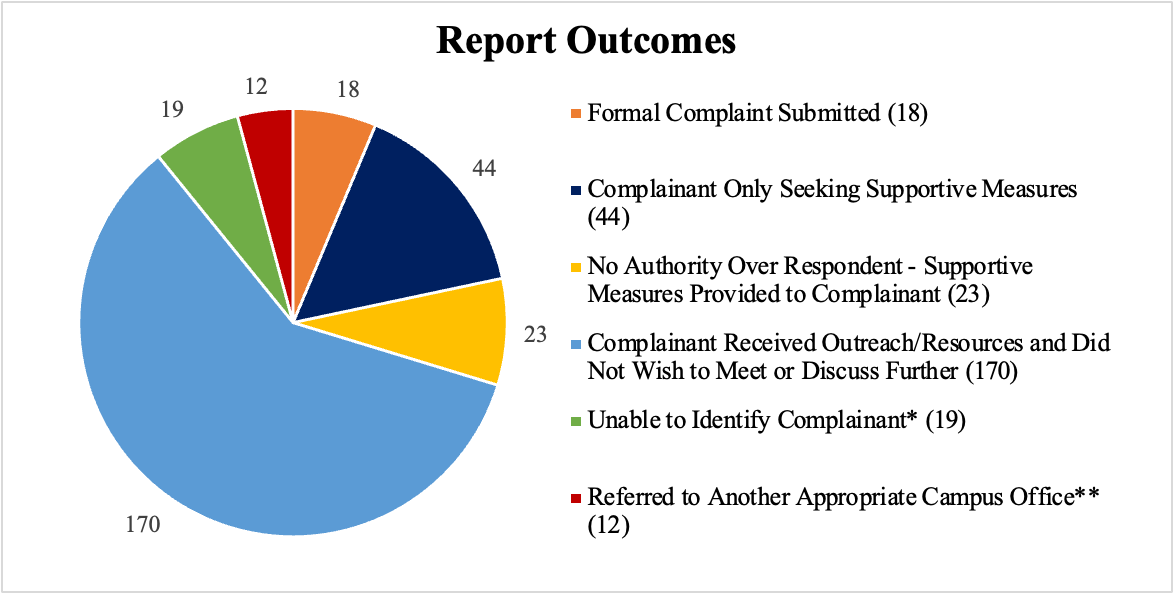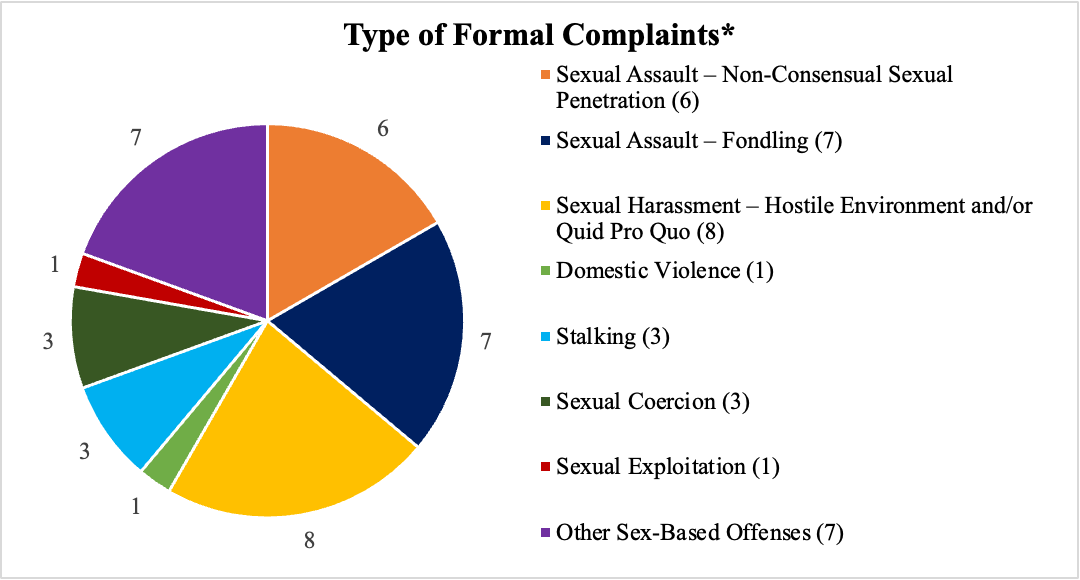This information is part of the 2022-23 OCRSM Annual Report.
July 1, 2022–June 30, 2023
This Annual Report focuses on the 286 reports of sex-based discrimination and harassment filed with the Office of Civil Rights and Sexual Misconduct ("the OCRSM") under the University of Maryland’s Policy and Procedures on Sexual Harassment and Other Sexual Misconduct ("the Policy and Procedures") between July 1, 2022, and June 30, 2023.
The University of Maryland is committed to creating and maintaining a working, learning, and living environment free from sex-based discrimination and harassment. The Policy and Procedures address the University’s obligations under Title IX. Title IX provides, “No person in the United States shall, on the basis of sex, be excluded from participation in, be denied the benefits of, or be subjected to discrimination under any education program or activity receiving Federal financial assistance.” The University, under the Policy and Procedures, goes beyond Title IX to include in its Prohibited Conduct other forms of sexual misconduct that go against the University’s core mission and values.
The Policy and Procedures applies to all members of the University community, including students, faculty, and staff. It also applies to contractors and other third parties who are engaged in any University Education Program or Activity, or who are otherwise interacting with the University, including, but not limited to volunteers, vendors, guests, and visitors. All University members are prohibited from engaging in, or assisting or abetting another’s engagement in Sexual Harassment, Other Sexual Misconduct, or Retaliation.
This Annual Report seeks to communicate a comprehensive overview of the reports received and services provided to all parties by the OCRSM in relation to sex-based discrimination and harassment.
Definitions
The OCRSM uses terminology that is consistent with federal law and may not be familiar to everyone. As a result, OCRSM includes definitions of key terms to assist reading and understanding this report. The full definitions of prohibited conduct are located within the Policy and Procedures.
Complainant
An individual who is alleged to have experienced sexual harassment.
Respondent
An individual who has been reported to be the perpetrator of conduct that could constitute sexual harassment.
Responsible University Employees (RUEs)
University community members who are required by the university to promptly report any information they learn about suspected or alleged sexual harassment to the Title IX Coordinator.
Confidential Resources
University community members who will not disclose personally identifying information about an individual to the Title IX Coordinator without that individual’s permission. Speaking with a confidential resource about sexual harassment will not constitute a report to the university or law enforcement.
Report
A report is when the Title IX Office is informed about suspected or alleged sexual harassment.
Formal Complaint
A document filed by a Complainant or signed by the Title IX Coordinator (under limited circumstances) alleging sexual harassment against a Respondent and requesting that the university initiate alternative resolution or formal resolution to resolve allegations of sexual harassment.
Reports and Formal Complaints Received
A report made to OCRSM alleges “Prohibited Conduct” committed by or against individuals affiliated with the University, under the the Policy and Procedures, which prohibits conduct including sexual harassment, other sexual misconduct, and retaliation.
Reports are submitted to the OCRSM through a variety of means including in person, by mail, by e-mail, or the OCRSM’s online reporting form. All UMD Administrators, Supervisors, Faculty, Teaching Assistants, Athletic Coaches, Athletic Trainers, and Resident Assistants are Responsible University Employees (RUEs) and are, hence, required to make a report to the UMD’s Title IX Coordinator when they become aware of any type of sexual misconduct. This reporting obligation applies regardless of when and where the conduct occurred.
Distinct from a report, a Formal Complaint is a document filed by a Complainant (the individual who is alleged to be the victim of Prohibited Conduct) or signed by the Title IX Coordinator alleging that a Respondent engaged in Prohibited Conduct and requesting that the University proceed with the resolution process under the the Policy and Procedures.
The OCRSM received more reports during this reporting period than in any previous reporting period, most likely due to an increase in training and expanded outreach, education, and prevention programs. The OCRSM provided education and programming in collaboration with multiple campus partners, including CARE to Stop Violence, the Sexual Assault Prevention Committee, the Department of Fraternity and Sorority Life, Athletics, the Title IX Student Advisory Board, and One Love UM. The OCRSM staff also facilitated more compliance training sessions during this reporting period than in any previous reporting period. To learn more about the training and education programs, please visit the "Live Training and Campus-Wide Awareness Events & Workshops" page of the 2022-23 OCRSM Annual Report and the "Online Training, Outreach, and Campus Involvement" page of the 2022-23 OCRSM Annual Report.
The graph below illustrates the reporting trends recorded by the OCRSM from 2014 to 2023, measured by the number of reports received during each fiscal year.
Types of Sexual Misconduct Reports
The table below lists the types of sexual misconduct that were initially reported to the OCRSM. Some reports encompass more than one type of sexual misconduct.
| Types of Sexual Misconduct Reports | Total Number |
|---|---|
| Sexual Assault – Non-Consensual Sexual Penetration | 40 |
| Sexual Assault – Fondling | 30 |
| Sexual Harassment – Hostile Environment and/or Quid Pro Quo | 94 |
| Dating Violence | 16 |
| Domestic Violence | 9 |
| Stalking | 21 |
| Attempted Sexual Assault | 1 |
| Sexual Coercion | 14 |
| Sexual Exploitation | 20 |
| Sexual Intimidation | 20 |
| Retaliation | 1 |
| Other Sex-Based Offenses | 7 |
| Sexual Assault - Type Unknown* | 40 |
| Other/Type Unknown** | 29 |
* Sexual Assault – Type Unknown means additional details regarding the type of reported sexual assault were not shared; the OCRSM was unable to identify a Complainant; and/or the Complainant made an anonymous report.
** Other/Type Unknown includes sex-based harassment that is not clearly defined when the report was submitted.
Location of Sexual Misconduct Reported
The table below denotes where the 286 reported incidents of sexual misconduct occurred.
| Location | Total Number |
|---|---|
| On Campus | 113 |
| Off Campus | 96 |
| Virtual* | 33 |
| Combination** | 5 |
| Unknown Location | 39 |
* Virtual means via internet, phone, texting, social media, etc.
** Combination refers to incidents that took place both on or off campus and virtually.
Supportive Measures Provided to Parties
Supportive Measures are “non-disciplinary, non-punitive individualized services offered as appropriate, as reasonably available, and without fee or charge to the Complainant or Respondent to restore or preserve equal access to educational programs or activities.” Supportive Measures are provided to both Complainants and Respondents and available regardless of whether a Formal Complaint is filed. Some individuals received multiple types of or ongoing Supportive Measures. The table below breaks down the type and number of Supportive Measures provided by the OCRSM.
| Supportive Measures Provided | Total Number |
|---|---|
| No Contact Order | 27 |
| Housing Relocation | 5 |
| Emergency Removal from Campus | 4 |
| Access Restrictions | 14 |
| Academic Support or Modifications | 42 |
| Referrals to Counseling or Health Services | 277 |
| Change in Parking Location | 3 |
| Other Supportive Measures* | 32 |
* Other Supportive Measures include additional support such as safety planning, arranging safety escorts, facilitating assistance obtaining protective or peace orders, and referrals to legal resources and/or other on- or off-campus support resources.
Sexual Misconduct Report Outcomes
When the OCRSM receives a report, the Title IX Coordinator or designee emails the potential Complainant. The outreach email contains an invitation to meet to discuss options for addressing the report under the Policy and Procedures, information about safety and Supportive Measures, and confidential and non-confidential resources. During the initial intake meeting, the Title IX Coordinator or designee helps facilitate a better understanding of the available resources and Supportive Measures, and the Formal Complaint and resolution processes, including the Informal Resolution and investigation/adjudication processes.
When a Formal Complaint is filed, the Title IX Coordinator conducts an assessment to determine whether the alleged conduct falls under the Policy and whether the University has jurisdiction over the matter. When the Title IX Coordinator determines that the matter will transition to the resolution process, the matter may move into an investigation/adjudication or informal resolution, as appropriate. All parties will receive written notice. When the matter moves to an investigation, which is an impartial fact-gathering process, the investigators gather all relevant information related to the Formal Complaint. Parties involved have an equal opportunity to review and respond to all information gathered during the investigation before the matter transitions to the Hearing. The Hearing Officer is an independent, external individual that is responsible for conducting a Hearing and determining whether or not the Policy was violated.
In some cases, an Informal Resolution may serve as an alternative, non-judicial process to resolve the Formal Complaint. Informal Resolution may encompass a variety of mutually agreed upon remedies, mediation, and/or education.
The table below highlights the outcomes of the 286 reports that the OCRSM received.
| Report Outcomes | Total Number |
|---|---|
| Formal Complaint Submitted | 18 |
| Complainant Only Seeking Supportive Measures | 44 |
| No Authority Over Respondent – Supportive Measures Provided to Complainant | 23 |
| Complainant Received Outreach/Resources and Did Not Wish to Meet or Discuss Further | 170 |
| Unable to Identify Complainant* | 19 |
| Referred to Another Appropriate Campus Office** | 12 |
* The OCRSM was unable to identify a Complainant to conduct outreach.
** The reported behavior was not based on Prohibited Conduct under the University of Maryland’s Policy and Procedures on Sexual Harassment and Other Sexual Misconduct. The report was referred to another appropriate office, such as University Human Resources, Office of Student Conduct, or the Department of Residential Life.
Formal Complaints – Types of Sexual Misconduct
This section focuses on the types of sexual misconduct alleged in the 18 Formal Complaints the Title IX Coordinator received during the 2022-23 reporting period. Some Formal Complaints encompass more than one type of Prohibited Conduct. The table below expands on the types of sexual misconduct that were alleged in the 18 Formal Complaints received by the Title IX Coordinator.
| Types of Formal Complaint | Total Number* |
|---|---|
| Sexual Assault – Non-Consensual Sexual Penetration | 6 |
| Sexual Assault – Fondling | 7 |
| Sexual Harassment – Hostile Environment and/or Quid Pro Quo | 8 |
| Domestic Violence | 1 |
| Stalking | 3 |
| Sexual Coercion | 3 |
| Sexual Exploitation | 1 |
| Other Sex-Based Offenses | 7 |
* Some Formal Complaints encompass more than one type of Prohibited Conduct.
Formal Complaint Outcomes
The table below demonstrates outcomes and sanctions, where applicable, resulting from Formal Complaints received during the 2022-23 reporting period.
| Incident Type(s) | Outcome | Sanction(s) | |
|---|---|---|---|
| 1 | Sexual Harassment – Quid Pro Quo, Sexual Harassment – Hostile Environment, and Other Sex-Based Offenses | Not Responsible: Sexual Harassment – Quid Pro Quo; Responsible: Sexual Harassment – Hostile Environment and Other Sex-Based Offenses | Termination of employment and affiliation with the University |
| 2 | Sexual Assault – Fondling, Sexual Exploitation, and Other Sex-Based Offenses | Permissive Dismissal of the Formal Complaint* | N/A – Permissive Dismissal of the Formal Complaint |
| 3 | Hostile Environment and Other Sex-Based Offenses | Responsible: Hostile Environment and Other-Sex Based Offenses | Ineligible to be rehired; extension of No Contact Order; and access restriction |
| 4 | Sexual Harassment – Hostile Environment, Stalking, and Other Sex-Based Offenses | Responsible: Hostile Environment, Stalking, and Other Sex-Based Offenses | Expulsion |
| 5 | Sexual Assault – Non-Consensual Sexual Penetration, Sexual Assault – Fondling, and Sexual Coercion | Not Responsible: Sexual Coercion; Responsible: Sexual Assault – Non-Consensual Sexual Penetration and Sexual Assault – Fondling | Suspension for three (3) years during which time Respondent is barred from the University premises (grounds and buildings) and prohibited from participating in any University-sponsored activity; extension of No Contact Order; and completion of a required education program related to consent and healthy relationships prior to returning to the University |
| 6 | Sexual Assault – Fondling | Responsible: Sexual Assault – Fondling | Suspension for two (2) semesters and required education to be completed prior to returning to the University |
| 7 | Sexual Assault – Non-Consensual Sexual Penetration, Sexual Assault – Fondling, and Sexual Coercion | Not Responsible: Sexual Coercion; Responsible: Sexual Assault – Non-Consensual Sexual Penetration, Sexual Assault – Fondling | Expulsion |
| 8 | Stalking and Other Sex-Based Offenses | Informal Resolution | No Contact Order and required education |
| 9 | Sexual Assault – Fondling and Other Sexual Misconduct | Responsible: Sexual Assault – Fondling and Other Sexual Misconduct – Other Sex-Based Offenses | Withheld suspension for two (2) semesters pending completion of an approved education program related to consent and healthy sexual relationships by December 31, 2023. |
| 10 | Sexual Harassment – Hostile Environment and Other Sex-Based Offenses | Responsible: Sexual Harassment – Hostile Environment and Other Sexual Misconduct – Other Sex-Based Offenses | Termination of employment and affiliation with the University |
| 11 | Sexual Harassment – Hostile Environment | Mandatory Dismissal of the Formal Complaint* | N/A – Mandatory Dismissal of the Formal Complaint |
| 12 | Sexual Assault – Non-Consensual Sexual Penetration and Sexual Assault – Fondling | Permissive Dismissal of the Formal Complaint* | N/A – Permissive Dismissal of the Formal Complaint |
| 13 | Sexual Assault – Non-Consensual Sexual Penetration | Outcome pending resolution during the 2023-24 reporting period | Pending |
| 14 | Sexual Assault – Non-Consensual Sexual Penetration, Sexual Assault – Fondling, and Sexual Coercion | Mandatory Dismissal of the Formal Complaint* | N/A – Mandatory Dismissal of the Formal Complaint |
| 15 | Sexual Harassment – Hostile Environment and Stalking | Responsible: Sexual Harassment – Hostile Environment and Stalking | Suspension for two (2) semesters; required education to be completed as a condition of resuming at the University; and extension of the No Contact Order |
| 16 | Other Sex-Based Offenses | Permissive Dismissal of the Formal Complaint* | N/A – Permissive Dismissal of the Formal Complaint |
| 17 | Sexual Assault – Non-Consensual Sexual Penetration and Sexual Assault – Fondling | Permissive Dismissal of the Formal Complaint* | N/A – Permissive Dismissal of the Formal Complaint |
| 18 | Domestic Violence | Permissive Dismissal of the Formal Complaint* | N/A – Permissive Dismissal of the Formal Complaint |
* For more information on when a Mandatory or Permissive Dismissal is appropriate, please refer to the University of Maryland’s Policy and Procedures on Sexual Harassment and Other Sexual Misconduct.
2021-22 Reporting Period
The table below contains outcomes and sanctions, where applicable, for Formal Complaints filed during the 2021-22 reporting period that were pending when the last report was issued.
| Incident Type(s) | Outcome | Sanction(s) | |
|---|---|---|---|
| 1 | Sexual Assault – Non-Consensual Sexual Penetration | Responsible: Sexual Assault – Non-Consensual Sexual Penetration | Suspension for three (3) years from academic program; extension of No Contact Order; and required education |
| 2 | Sexual Assault – Non-Consensual Sexual Penetration, Dating Violence, Attempted Sexual Assault, and Retaliation | Not Responsible: Sexual Assault – Non-Consensual Sexual Penetration, Dating Violence, Attempted Sexual Assault, and Retaliation | N/A – Not Responsible |
| 3 | Sexual Harassment – Hostile Environment, Stalking, Sexual Coercion, Sexual Exploitation, Other Sex-Based Offenses, and Retaliation | Not Responsible: Sexual Harassment – Hostile Environment, Stalking, Sexual Coercion, Sexual Exploitation, Other Sex-Based Offenses, and Retaliation | N/A – Not Responsible |
| 4 | Sexual Assault – Non-Consensual Sexual Penetration, Sexual Assault – Fondling, Sexual Coercion, Sexual Intimidation, and Attempted Sexual Assault | Permissive Dismissal of the Formal Complaint* | N/A – Permissive Dismissal of the Formal Complaint |
| 5 | Sexual Harassment – Hostile Environment, Attempted Sexual Assault, and Other Sex-Based Offenses | Not Responsible: Sexual Harassment – Hostile Environment, Attempted Sexual Assault, and Other Sex-Based Offenses | N/A – Not Responsible |
| 6 | Sexual Assault – Fondling and Sexual Exploitation | Not Responsible: Sexual Assault – Fondling, and Sexual Exploitation | N/A – Not Responsible |
| 7 | Sexual Assault – Non-Consensual Sexual Penetration | Permissive Dismissal of the Formal Complaint* | N/A – Permissive Dismissal of the Formal Complaint |
| 8 | Sexual Assault – Non-Consensual Sexual Penetration and Dating Violence | Not Responsible: Dating Violence; Responsible: Sexual Assault – Non-Consensual Sexual Penetration | Expulsion |
| 9 | Dating Violence | Responsible: Dating Violence | Expulsion |
* For more information on when a Mandatory or Permissive Dismissal is appropriate, please refer to the University of Maryland’s Policy and Procedures on Sexual Harassment and Other Sexual Misconduct.




